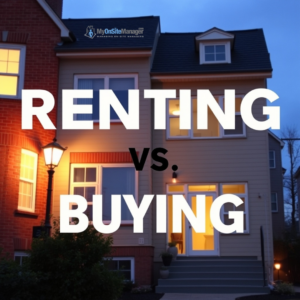
Deciding whether to rent or buy a home is a significant financial milestone. While homeownership is often considered a key part of the “American Dream,” renting can provide flexibility and fewer upfront costs. However, with rising mortgage rates and fluctuating rental prices, the decision isn’t as straightforward as it used to be.
According to a recent Business Insider report, the median rent in the U.S. is currently $1,406 per month, whereas the median monthly mortgage payment stands at $1,904. This suggests that renting is generally more affordable on a monthly basis, but does this mean it’s the better option? Let’s dive into the cost comparisons across different states and explore the key factors that should influence your decision.
The Most Affordable States for Renters
If you’re leaning toward renting, some states offer significantly lower median rental prices than others. Here are the five most affordable states for renters:
- West Virginia – $850
- Mississippi – $898
- North Dakota – $916
- South Dakota – $921
- Kentucky – $929
In these states, renters can find a place to live for less than $1,000 per month, making them attractive options for those who prioritize affordability and flexibility.
However, while renting may be cheaper in the short term, it doesn’t build equity. This is where the long-term benefits of homeownership come into play.
The Most Affordable States for Homebuyers
If you’re considering buying a home, your monthly mortgage payment will largely depend on the state you choose. The following states have the lowest median mortgage payments:
- West Virginia – $1,208
- Arkansas – $1,315
- Mississippi – $1,321
- Indiana – $1,359
- Alabama – $1,372
While a mortgage in these states may cost more than renting, the difference is often marginal. Additionally, homeownership provides stability and the opportunity to build wealth over time.
However, before jumping into homeownership, it’s essential to consider factors such as property taxes, maintenance costs, and mortgage interest rates.
Renting vs. Buying: The Financial Breakdown
Although renting may seem like the cheaper option based on monthly costs, it’s important to factor in the financial benefits of homeownership, including equity and appreciation. Here’s a side-by-side comparison of renting vs. buying:
| Factor | Renting | Buying |
|---|---|---|
| Upfront Costs | Security deposit (1-2 months’ rent) | Down payment (5-20% of home price) |
| Monthly Expenses | Fixed monthly rent (potential rent hikes) | Mortgage (principal + interest), property taxes, insurance, maintenance |
| Long-Term Costs | No equity, money spent on rent is not an investment | Builds home equity over time, potential appreciation |
| Flexibility | Easy to move, lease renewal every year | Tied to a specific location, selling process can take time |
| Responsibility | Landlord handles repairs and maintenance | Homeowners must manage maintenance and repairs |
As you can see, each option has its own advantages and drawbacks. The decision depends on your financial stability, lifestyle preferences, and long-term goals.
Key Factors to Consider When Choosing to Rent or Buy
1. Your Financial Health
- Do you have enough savings for a down payment?
- Can you afford the ongoing costs of homeownership, including property taxes, insurance, and repairs?
- Is your credit score high enough to secure a favorable mortgage rate?
2. Market Conditions
- Is the housing market in your area overpriced?
- Are mortgage rates rising or falling?
- Is rent increasing at an unsustainable pace?
3. Your Lifestyle and Career Plans
- Do you plan to stay in one location for at least 5-10 years?
- Are you in a career that might require relocation?
- Do you prefer the flexibility of renting, or are you ready to commit to a property long-term?
If you anticipate moving frequently or aren’t ready for the financial responsibilities of homeownership, renting might be the better option. However, if you’re financially stable and plan to stay in one place for several years, buying can be a smart investment.
Conclusion: Should You Rent or Buy?
There is no one-size-fits-all answer when it comes to renting vs. buying. Your financial situation, career stability, and personal goals should all play a role in your decision.
Renting is a good option if:
- You need flexibility and may relocate within the next few years.
- You don’t want to deal with maintenance and repairs.
- You prefer lower upfront costs and predictable expenses.
Buying is a good option if:
- You want to build equity and invest in your future.
- You plan to stay in one place for a long time.
- You’re financially stable and can handle mortgage payments, taxes, and maintenance.
Ultimately, the choice comes down to what makes the most sense for your current lifestyle and long-term financial goals.
For more details, check out the full article on Business Insider:
How Much It Costs to Buy or Rent in Each State
